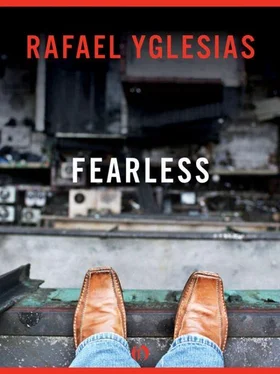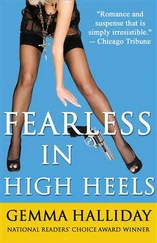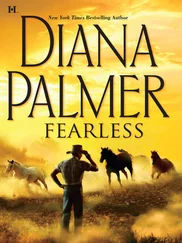That wasn’t true, although it was the truth as Debby knew it, only camouflaged so Max couldn’t answer bluntly. He tried anyway. “You see? I’m already being blamed for other people’s weaknesses. That’s exactly why I don’t want to go.”
“Then don’t go.” Debby and Jonah staggered up the hill together, pretending indifference, unbalanced in each other’s arms like drunken lovers.
How long has it been? Max asked himself. Two weeks? Three? He felt sluggish. Must be three, he decided. Maybe he shouldn’t go to his in-laws. If he waited much longer before another joyride, perhaps he would lose his nerve. Watching his wife and son enter his in-laws’ courtyard, he thought: That would be worse than anything: to live scared like them.
“Come on, Dad!” Jonah called cheerfully. He made a dumb show of urging Max, waving his right arm with sweeping movements as if his father were an ungainly truck he had to maneuver into a narrow loading dock.
Crossing his in-laws’ pretentious inner central court to the recessed lobby Max was reminded of Byron’s medieval renderings. Since high school, when Max first learned all he could about the building of the city of his birth, he had known that the then-disreputable upper Riverside Drive apartment buildings were originally built for the prosperous new middle class of the turn of the century. Perhaps the cracked cement courtyard, painted a dark dull red by the co-op board, had once been colorfully tiled, probably with the bright yellows and blues of Mediterranean Europe. Max had seen photographs of one building from the period with such romantic flourishes. And there had almost certainly been a water fountain in the center where now there was only a discreet drainage grate. At the four corners of the courtyard that had once been overseen by cherubim statuary, there were security mirrors to help tenants spot potential muggers. For Max, these were banal observations about the frightened utility of the modern world, but that didn’t prevent his eye from making note each time, and to feel disappointed each time. He couldn’t shake the thrilling and eerie sensation just as he entered the courtyard that this time he would find 370 Riverside Drive restored to its petit bourgeois elegances.
Harry opened the door to them. Flora’s cooking accompanied him.
“Smells great,” Max said over Harry’s hellos. “Let’s eat right away. No drinks in the living room. Show me the bowl of stuffing and I’ll put my face in it.” One of the many marvelous aftereffects of the crash was that Max could eat without restraint and without gaining weight, whether he exercised or not. It’s my crash diet, he told Debby. She was appalled by the pun.
“That would be appetizing for the rest of us,” his wife commented. She embraced and kissed her father with the abandon of a little girl, even though she was his height, taller in the heels she had on and broader in the shoulder. “Hi, Daddy,” she said, her consonants as soft as a two-year-old’s.
The sound of a child running came at them from the long hall that led to the living room. It was Byron. A color printout of a design fluttered behind him. “Look what I did.” He waved what appeared to be another elaborate fortress. “My dad got me a MAC and a color printer and Architron.”
They were rich. The computer, printer, and architectural design software must have cost them at least six thousand dollars. Max had wanted to get one for the office but Jeff — never a fan of speediness — had said, “For what? We should buy an expensive machine and get our work done faster so we can bill them for fewer hours?”
Byron pushed his way between Jonah and Max. “Isn’t it cool? You can design anything with Architron.”
“Rad, man,” Jonah said in a soft, mocking voice. “Real rad.”
“I taped the Civil War ,” Harry said. He waved the back of his hand dismissively at the floor, scrunching his thick gray and black eyebrows together. “Despite its flaws. I’ve set it up in the bedroom with the video recorder. I thought the boys might be interested.”
Jonah lowered his head, a child turtle, hiding in his protective shell, staying dry from the downpour of his grandfather’s love of imparting learning.
“I’ll be happy to watch the Civil War ,” Max said. “But I’m sure the boys would rather have molten lava poured down their throats.”
Startled by the joke, Jonah laughed hard. His head popped out and his teeth showed. The unrestrained pleasure lasted only a second. Embarrassed, he covered his mouth and moved beside his mother, glancing nervously at Harry. Harry was upset. His face had widened at Max’s comment, dense eyebrows untangling, eyes shocked open. And he flinched at Jonah’s laughter.
“I want to!” Byron said, bouncing in front of Harry. “I’m interested.” He turned to Max: “If you watch and explain stuff.”
“You see,” Harry said, pointing at Byron with desperate satisfaction. A flush of embarrassment was still on his cheeks although he now had Byron for a willing student. He rewarded Byron for his eagerness by tousling his hair. “It’s pretty good history. A hell of a lot more interesting than your teachers can make it,” he commented to Jonah. He added to Max, “Of course they make short shrift of the causes and Shelby Foote’s sentimental anecdotes are both pointless and misleading but I think its treatment of the battles is first-rate. And boys like battles, don’t they? Are you sure you aren’t interested, Jonah?” Harry said, saying his grandson’s name with a hint of displeasure. It was implied anyway since he said Jonah instead of Nonah. Nonah was the affectionate nickname Harry routinely used.
“Okay,” Jonah said, drawling the word. But he took another step back from his grandfather and closer to his mother. “I’ll watch it for a while.”
“If you don’t want to, say no,” Max said.
“I do!” Jonah insisted.
“No you don’t,” Max said.
“Max, for God’s sake give him a break,” Debby said, but mildly, and called toward the kitchen entrance as she walked in that direction: “Ma? You need help?”
“Come on, boys,” Harry said, gratified by his grandson’s agreement, even if it was bullied. He draped an arm around Jonah’s shoulders and pulled him down the hall. “Do you know about the second battle of the Wilderness? They fought two battles in the same woods only a year apart. There were soaking rains in the weeks before the second battle and the dead from the first — they had been buried in shallow graves — rose to the surface.”
“You mean, they came up out of the ground?” Jonah asked.
“Exactly,” his grandfather patted his head as though giving him an A.
“Gross,” Jonah said.
“I know what dead bodies look like!” Byron shrieked proudly.
They had reached the open double-door entrance to the living room. Once there had been sliding oak doors or perhaps they were glass-paneled. When these buildings were designed apartment dwellers still had the romantic desire to imitate the gracious compartments of large homes, each room dedicated to one aspect of living. Modernism had taught New Yorkers to accept that they were creatures of a concrete and metal arbor — apes with elevators living in one-room tree houses. Byron’s parents stood just inside the open doorway, drinks in their hands. They had been listening to Nan with polite expressions. Peter and Diane Hummel were dressed formally, he in a suit, she in a sedate dress that could easily be a suit. Nan was wearing jeans and a white T-shirt. Underneath the T-shirt she had on a black bra that showed through the white. Her breasts were large, and the effect was more obscene than if she had put on nothing. She waved her arms in the air, talking garrulously as Max, Harry and the boys approached. She looked wild, her usually straight blond hair teased out from her head, her widespread arms showing off her breasts, targeted by the shiny black bra — but even she was stopped by Byron’s remark.
Читать дальше












